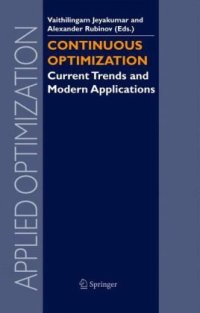
Ebook: Continuous Optimization: Current Trends and Modern Applications
- Genre: Mathematics // Applied Mathematicsematics
- Tags: Optimization, Mathematical Modeling and Industrial Mathematics, Operations Research Mathematical Programming, Applications of Mathematics
- Series: Applied Optimization 99
- Year: 2005
- Publisher: Springer US
- Edition: 1
- Language: English
- pdf
The search for the best possible performance is inherent in human nature. Individuals, enterprises and governments all seek optimal—that is, the best—possible solutions of problems that they meet. Evidently, continuous optimization plays an increasingly significant role in everyday management and technical decisions in science, engineering and commerce.
The collection of 16 refereed papers in this book covers a diverse number of topics and provides a good picture of recent research in continuous optimization. The first part of the book presents substantive survey articles in a number of important topic areas of continuous optimization. Most of the papers in the second part present results on the theoretical aspects as well as numerical methods of continuous optimization. The papers in the third part are mainly concerned with applications of continuous optimization.
Hence, the book will be an additional valuable source of information to faculty, students, and researchers who use continuous optimization to model and solve problems.
Audience
This book is intended for researchers in mathematical programming, optimization and operations research; engineers in various fields; and graduate students in applied mathematics, engineering and operations research.
The search for the best possible performance is inherent in human nature. Individuals, enterprises and governments are seeking optimal, that is, the best possible, solutions for problems that they meet. Evidently, continuous optimization plays an increasingly significant role in everyday management and technical decisions in science, engineering and commerce. The collection of 16 refereed papers in this book covers a diverse number of topics and provides a good picture of recent research in continuous optimization. The first part of the book presents substantive survey articles in a number of important topic areas of continuous optimization. Most of the papers in the second part present results on the theoretical aspects as well as numerical methods of continuous optimization. The papers in the third part are mainly concerned with applications of continuous optimization. Hence, the book will be an additional valuable source of information to faculty, students, and researchers who use continuous optimization to model and solve problems.